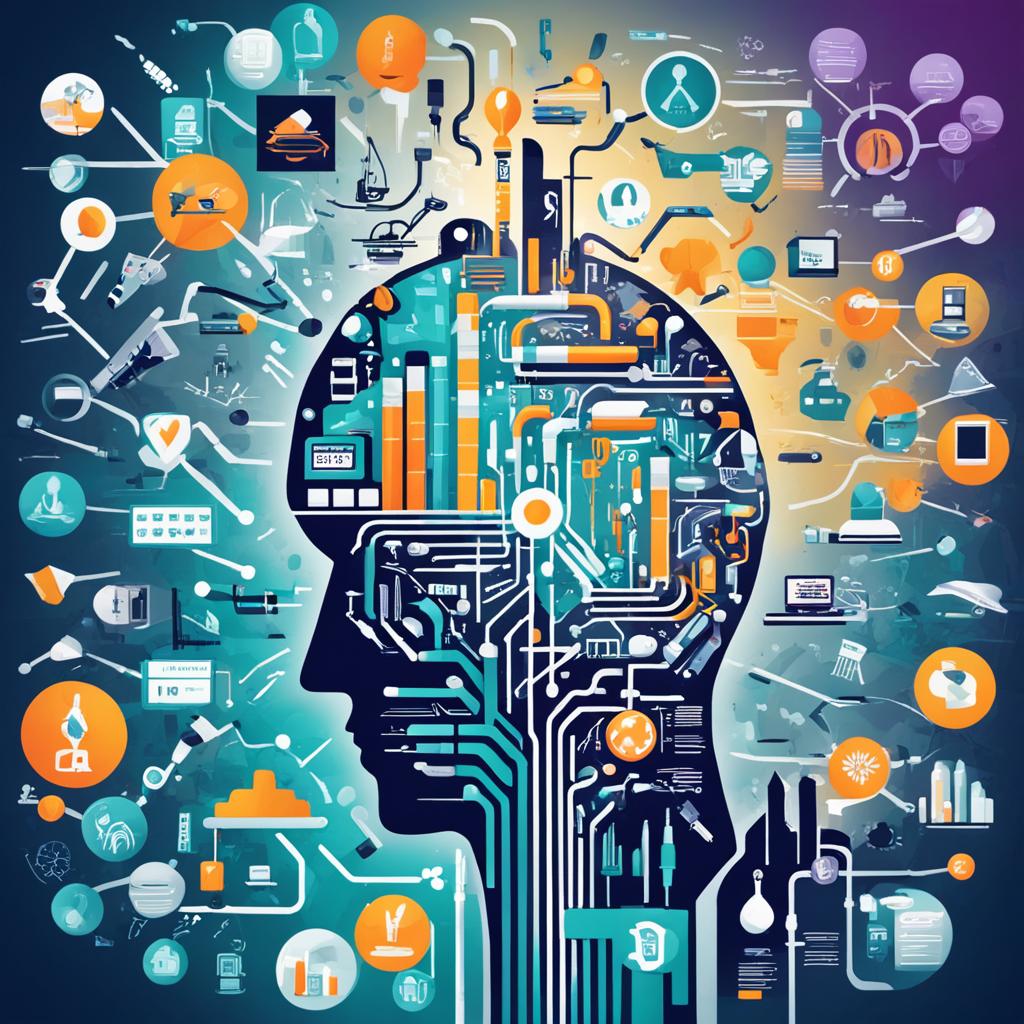Did you know that addiction affects over 21 million Americans? It’s a staggering statistic that highlights the widespread impact of addiction on individuals and society. While substance abuse has long been recognized as a significant problem, the rise of the digital age has introduced a new form of addiction – internet addiction. As technology becomes an integral part of our daily lives, understanding the connection between substance abuse and internet addiction is crucial in addressing these complex issues.
Understanding Addiction: Causes and Risk Factors
Addiction is a complex condition that affects millions of individuals worldwide. To gain a deeper understanding of addiction, it is essential to explore the various causes and risk factors associated with this pervasive issue. By examining the role of genetics, environment, and psychological factors, we can begin to unravel the intricate web of addiction.
The Role of Genetics
Genetics play a significant role in an individual’s susceptibility to addiction. Research has shown that certain genes can increase the likelihood of developing substance abuse disorders. These genes can influence the brain’s reward system, making some individuals more prone to seeking pleasurable experiences through substances.


The Impact of Environment
Environmental factors also contribute to the development of addiction. Growing up in an environment where substance abuse is prevalent, such as a home with drug-addicted parents or a neighborhood with high rates of drug use, increases the risk of addiction. Additionally, exposure to trauma, stress, and peer pressure can influence individuals to turn to substances as a coping mechanism.
Psychological Factors
Psychological factors, such as mental health disorders, can be both a cause and a consequence of addiction. Many individuals with addiction struggle with underlying conditions like depression, anxiety, or trauma-related disorders. Substance abuse often serves as a way to self-medicate or escape from these challenging emotional experiences, leading to a vicious cycle of addiction and mental health issues.
“Understanding the causes and risk factors associated with addiction is crucial in developing effective prevention and treatment strategies.” – Dr. Emily Simmons, Addiction Specialist
Furthermore, the impact of substance abuse on mental health should not be overlooked. Prolonged drug or alcohol use can lead to changes in brain chemistry, exacerbating existing mental health disorders or triggering the development of new ones. This interplay between substance abuse and mental health highlights the need for comprehensive and integrated treatment approaches.
By comprehensively examining the causes and risk factors associated with addiction, we can gain valuable insights into the underlying mechanisms that drive addictive behaviors. This knowledge is essential in developing targeted prevention initiatives and effective treatment approaches that address the multifaceted nature of addiction.
The Neurobiology of Addiction
Addiction is a complex and multifaceted condition that profoundly affects the brain. Understanding the neurobiology of addiction is crucial in comprehending why individuals develop addictive behaviors and how substances hijack the brain’s reward system.
At the core of addiction lies the brain’s reward pathway, a complex network of structures that regulate motivation, pleasure, and reinforcement. When a person engages in rewarding activities, such as eating delicious food or engaging in social interactions, the brain releases neurotransmitters like dopamine, which produces feelings of pleasure and reinforces those behaviors.


However, addiction disrupts this delicate balance. When substances like drugs or alcohol are introduced into the body, they stimulate the brain’s reward system by artificially increasing dopamine levels. This flood of dopamine creates an intense euphoria, reinforcing drug-seeking behaviors.
Over time, repeated substance use leads to tolerance, where the brain becomes less responsive to the substance’s effects. Tolerance drives individuals to consume larger amounts of the substance to achieve the desired level of euphoria. This vicious cycle further reinforces the addictive behavior and poses significant risks to an individual’s health.
The Role of Withdrawal and Cravings
Another key aspect of addiction is the development of withdrawal symptoms and cravings. When someone becomes dependent on a substance, their body adapts to the presence of the drug. If the drug is abruptly discontinued or the individual tries to reduce their intake, they may experience a range of distressing physical and psychological symptoms collectively known as withdrawal.
The brain’s attempt to regain equilibrium after the abrupt removal of the substance leads to intense cravings, which can drive individuals to seek out the drug and engage in addictive behaviors. These cravings are often triggered by environmental cues associated with the substance, further reinforcing the addiction cycle.
“Addiction is a chronic relapsing brain disease characterized by compulsive drug seeking and use, despite harmful consequences.”
Breaking the Cycle
Understanding the neurobiology of addiction underscores the importance of comprehensive treatment approaches that address both the biological and psychological factors underlying addictive behaviors. Effective treatment often involves a combination of medication, therapy, and support groups tailored to the individual’s needs.
By targeting the brain mechanisms involved in addiction, treatments aim to restore balance to the reward system and reduce the cravings and withdrawal symptoms that drive addictive behaviors. Additionally, therapy helps individuals develop coping strategies and address underlying emotional issues that may contribute to their addiction.
The neurobiological understanding of addiction provides valuable insights into the complexity of substance abuse. By grasping the intricate interplay between the brain and addictive behaviors, researchers and clinicians can develop more effective interventions that not only address the symptoms but also tackle the underlying causes of addiction.
Psychological Models of Addiction
Understanding addiction requires exploring various psychological models that provide insights into its complexities. Three prominent models that shed light on addiction are the biopsychosocial model, the cognitive-behavioral model, and the psychodynamic model.
The biopsychosocial model acknowledges that addiction arises from a combination of biological, psychological, and social factors. It recognizes that biological predispositions, such as genetic vulnerabilities, interact with environmental influences and personal experiences to contribute to addictive behavior.
The cognitive-behavioral model emphasizes how our thoughts and behaviors influence addiction. It posits that distorted thinking patterns, irrational beliefs, and maladaptive coping mechanisms play a significant role in the development and maintenance of addiction. This model highlights the importance of addressing cognitive processes and behavioral patterns to facilitate recovery.
The psychodynamic model delves into the unconscious motivations and unresolved conflicts that underlie addictive behavior. It suggests that early life experiences, unresolved emotions, and unconscious desires contribute to the development of addiction. This model emphasizes the exploration of unconscious processes and the therapeutic relationship to uncover and address underlying psychological issues.
Psychological models of addiction provide frameworks for understanding the multifaceted nature of addiction and guide treatment approaches. By examining various aspects, including biology, cognition, and psychology, these models contribute to a comprehensive understanding of addiction.
The biopsychosocial model, cognitive-behavioral model, and psychodynamic model all contribute unique perspectives to our understanding of addiction. While each model underscores different elements of addiction, they collectively inform treatment approaches by recognizing the interconnectedness of biological, psychological, and social factors.


Further exploration of these psychological models helps clinicians and researchers develop effective interventions tailored to individuals struggling with addiction. By addressing the biological, cognitive, and psychological aspects of addiction, treatment providers can empower individuals in their journey towards recovery.
Substance Abuse and Co-Occurring Disorders
Substance abuse often goes hand in hand with co-occurring mental health disorders, creating complex challenges for individuals seeking recovery. Addiction can be closely intertwined with conditions such as depression, anxiety, and post-traumatic stress disorder (PTSD), further exacerbating the struggles individuals face.
Depression is a common co-occurring disorder among those grappling with substance abuse. The emotional roller coaster of addiction can intensify feelings of despair and hopelessness, leading to a vicious cycle that is difficult to break. Substance abuse may provide temporary relief from depressive symptoms, but it ultimately worsens the condition in the long run.
Anxiety disorders, including generalized anxiety disorder and panic disorder, frequently coexist with substance abuse. The debilitating effects of anxiety can drive individuals to seek solace in drugs or alcohol, which temporarily alleviate their symptoms. However, substance abuse only serves to perpetuate and intensify anxiety over time, creating a dangerous cycle of dependency and increased anxiety levels.
“The combination of substance abuse and anxiety can create a feedback loop, making it challenging for individuals to break free from the grips of addiction,” says Dr. Emily Mitchell, a renowned addiction specialist.
Post-traumatic stress disorder (PTSD) is another co-occurring disorder commonly seen in individuals battling substance abuse. Traumatic experiences can lead to self-medication and substance abuse as a means to numb the painful memories and emotional distress associated with the past. Unfortunately, the relief provided by substances is temporary, and the underlying trauma remains unresolved.
Addressing co-occurring mental health disorders is crucial in addiction treatment and recovery. Dual diagnosis treatment programs that focus on both substance abuse and underlying mental health conditions have shown promising results. By treating addiction and co-occurring disorders concurrently, individuals have a better chance of achieving long-term recovery and improved mental well-being.


Key Takeaways:
- Substance abuse often coexists with mental health disorders such as depression, anxiety, and PTSD.
- The cycle of addiction can worsen symptoms of depression, creating a challenging situation for individuals.
- Anxiety disorders can drive individuals towards substance abuse as a means of temporary relief, intensifying the problem in the long term.
- PTSD and substance abuse commonly occur together, with individuals self-medicating to cope with trauma.
- Integrated treatment programs that address both addiction and co-occurring mental health disorders offer the best chance of recovery.
Internet Addiction: Understanding the Phenomenon
Internet addiction is an emerging issue in our technology-driven society. With the widespread availability of high-speed internet and the increasing dependency on digital devices, many individuals find themselves struggling with excessive internet use which negatively impacts their mental health and overall well-being.
Internet addiction is characterized by compulsive and uncontrollable internet usage, leading to neglect of personal and professional responsibilities. Common symptoms of internet addiction include spending excessive amounts of time online, experiencing withdrawal symptoms when not connected to the internet, and continuously escalating online activities to achieve the desired level of gratification.
Excessive internet use can have detrimental effects on mental health and overall quality of life. It can lead to feelings of loneliness, isolation, and depression, as individuals spend more time in virtual spaces than engaging in real-life social interactions. The constant exposure to online content can also contribute to increased anxiety and stress levels.
It is important to note that not all internet use is considered addictive or problematic. However, when internet use starts interfering with daily life and causing significant distress, it may be indicative of internet addiction.


The image above visually represents the allure and obsession associated with internet addiction, highlighting the need for awareness and understanding of this modern phenomenon.
The Connection between Substance Abuse and Internet Addiction
Substance abuse and internet addiction are two significant issues that often go hand in hand. Many individuals who struggle with substance abuse find themselves also grappling with internet addiction, and vice versa. The co-occurrence of these two addictive behaviors can intensify their impact on individuals’ lives and pose unique challenges in treatment and recovery.
Substance abuse refers to the compulsive use of substances such as drugs or alcohol, despite the negative consequences it may have on physical and mental health. On the other hand, internet addiction involves an excessive and uncontrollable use of the internet, leading to negative effects on various aspects of life, including relationships, work, and overall well-being.
These two forms of addiction often share common psychological factors that contribute to their development. For example, individuals may turn to substances or the internet as coping mechanisms for stress, anxiety, or other underlying mental health issues. The desire for escape or relief can create a cycle of reliance on both substances and the internet.
“The co-occurrence of substance abuse and internet addiction can be explained by the similar psychological factors that contribute to their development. They both serve as coping mechanisms and provide a temporary escape from negative emotions or life stressors.”
Moreover, engaging in substance abuse can increase the likelihood of developing internet addiction. Substance abuse can impair judgment, increase impulsivity, and weaken self-control, making individuals more susceptible to excessive internet use. Conversely, excessive internet use can contribute to social isolation and boredom, which may lead individuals to seek comfort in substances as a means of escape.
Additionally, the instant gratification and pleasure-seeking aspects associated with both substance abuse and internet addiction can reinforce their co-occurrence. The brain’s reward system is activated when an individual engages in addictive behaviors, releasing dopamine and reinforcing the desire to repeat those behaviors. This shared reward pathway can contribute to the simultaneous craving and engagement in both substance abuse and excessive internet use.
The complex relationship between substance abuse and internet addiction suggests the need for an integrated approach to treatment. Addressing both addiction behaviors simultaneously can enhance the effectiveness of interventions and promote sustained recovery. Treatment options may include therapy, support groups, and developing healthy coping mechanisms to replace addictive behaviors.
To summarize, substance abuse and internet addiction often co-occur and reinforce each other due to shared psychological factors and reward systems in the brain. Understanding this connection is crucial in providing comprehensive and holistic treatment approaches for individuals struggling with these addictive behaviors.
Treating Addiction in the Digital Age
In the digital age, addressing addiction requires innovative and tailored interventions that encompass both substance abuse and internet addiction. As these two forms of addiction often co-occur and reinforce each other, it is crucial to understand the challenges and opportunities that arise in the treatment process.
Addiction treatment in the digital age relies on leveraging technology as a tool for recovery. With the prevalence of smartphones, tablets, and the internet, incorporating digital platforms into treatment programs can enhance accessibility and engagement.
One effective approach is the use of mobile applications specifically designed to support individuals in their recovery journey. These apps can provide real-time tracking of substance use, offer coping strategies, and deliver relapse prevention techniques. By harnessing the power of technology, individuals can receive ongoing support and guidance wherever they are.
Technology-Assisted Therapies
Technology-assisted therapies have also emerged as valuable tools in addiction treatment. These therapies, such as teletherapy and virtual reality, allow individuals to receive counseling and support remotely, eliminating barriers like geographical distance and time constraints.
Teletherapy offers the convenience of virtual sessions with licensed therapists, enabling individuals to access crucial support from the comfort of their own homes. Virtual reality, on the other hand, creates immersive and interactive environments that simulate real-world scenarios. This technology can be utilized to desensitize individuals to triggers and teach coping mechanisms in a safe and controlled setting.
The Importance of Personalization
Personalization is key in the treatment of addiction, as each individual’s journey is unique. Tailoring treatment plans to address both substance abuse and internet addiction ensures a comprehensive approach that recognizes the complexities of addiction in the digital age.
Collaborative care models that involve multidisciplinary teams, including addiction specialists, mental health professionals, and technology experts, can provide a holistic and individualized treatment experience. This approach takes into account the individual’s specific needs, preferences, and challenges, maximizing the chances of successful recovery.
Technology has revolutionized the way we approach addiction treatment. By integrating digital tools and personalized interventions, we can create a more effective and accessible path to recovery.
As the digital landscape continues to evolve, so too must our strategies for treating addiction. By harnessing the power of technology and customizing treatment approaches, we can empower individuals to overcome addiction and reclaim their lives in the digital age.
Conclusion
In conclusion, this article has explored the complex nature of addiction and its profound impact on individuals in the digital age. From substance abuse to internet addiction, our understanding of addiction has expanded to encompass a range of behaviors and dependencies.
Throughout the article, we have examined the causes and risk factors associated with addiction, including genetic, environmental, and psychological factors. Furthermore, we have delved into the neurobiological mechanisms that underlie addiction, shedding light on how substances hijack the brain’s reward system.
Additionally, we have explored various psychological models that contribute to our understanding of addiction, such as the biopsychosocial, cognitive-behavioral, and psychodynamic models. These models have further informed treatment approaches to address addiction comprehensively.
Furthermore, we have highlighted the common occurrence of co-occurring mental health disorders in individuals struggling with substance abuse, emphasizing the need for integrated treatment approaches. Moreover, the emergence of internet addiction as a significant issue has emphasized the importance of addressing both substance abuse and internet addiction in our digital age.
As we move forward, it is crucial to recognize the challenges and opportunities in treating addiction in the digital age. Tailored interventions that encompass both substance abuse and internet addiction, while incorporating technology as a tool for recovery, are essential for comprehensive treatment.
By understanding addiction, its psychological aspects, and the interplay between substance abuse and internet addiction, we can work towards more effective prevention, intervention, and support for those struggling with addiction in our modern world.
